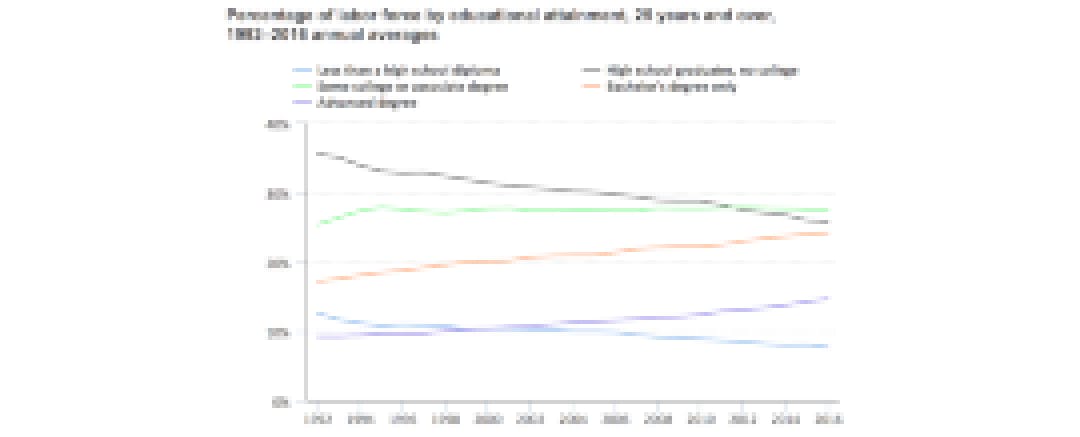If you’re wondering why online learning is booming, take a look at the latest U.S. Department of Labor data showing heightened demand for skilled workers. Those with an undergraduate or advanced degree now represent about 40 percent of the nation’s workforce, while those with just a high school diploma have slipped in the last 25 years from more than a third to about a quarter of American workers.

The graph is a vivid illustration of the present condition of economic life in America. The nation has been fiercely transformed into a post-industrial society in which accelerating technology has cast off large numbers of factory laborers, but hasn’t created enough new jobs in the service sector or in information-based roles to fill the gap.
The trend lines for those with undergraduate and advanced degrees show a steady rise in prosperity, while the lines for those with no degree sink rapidly downward. Since 2012, workers with some college or higher education now make up the largest share of the U.S. civilian labor force.
The clear message for employees who stay in the workforce without a college degree is that their future options are limited. Eventually, they may find themselves out of work altogether. Today, about nine million Americans are unemployed, most of them unskilled.
To escape that harsh outcome, workers without a college degree who are looking to advance must take a stab at enrolling at their nearest college campus, or turn to one of the growing numbers of online degree programs. Logistically, it is often difficult or impossible for working adults to get to traditional campuses to pursue degrees, which make those online options so attractive. Seventy percent of online undergrads and 80 percent of online graduate students work full or part time. America’s thirst for a highly-skilled workforce is driving the expansion of digital learning. Recent data from the nation’s residential colleges show a decline in enrollment, while online is surging at its fastest pace in memory.
Post-Industrial Economy
In the last century, you didn't need a college degree to get a decent job. A high school diploma was more than enough. In Chelsea, my neighborhood in Manhattan, an elevated railroad that fed hungry factories along the Hudson until 1980 has been turned into a nature walk, with its steel tracks marking flower beds dancing with exotic blooms. Galleries and high-end condos have evicted assembly lines that stretched alongside the old railway. Elsewhere in the U.S., other factory neighborhoods have not been so lucky, debased by crumbling warehouses and defeated production facilities. My father, a tailor from Poland without a high school diploma, worked productively for years in a men’s clothing factory—in what was then called the “needle trades”—not far from my current apartment. Today, without a college education, but armed with his old-word mastery, his chances of earning a good living would be pretty poor.
Today’s vastly transformed economy requires workers with post-industrial skills. One website recommends that the best jobs are in high-tech—cloud computing, artificial intelligence, user-experience design, natural language processing, software testing, among others. It’s a rare high school graduate who commands any of these. Luckily, college students who graduate without STEM degrees, have a chance at finding a job in the new economy if they can demonstrate other in-demand “soft skills”—creativity, collaboration, adaptability, time management, leadership. Forget driving rivets, welding, or--like my father--cutting suit patterns.
In the digital economy, not every discipline guarantees that students will get a good job upon graduation. Not every field offers robust prospects. Depressingly, enrollment in history, philosophy, literature (my major in college) and other departments has been falling for decades. Some colleges are closing liberal arts programs and a cascade of small liberal arts colleges have gone under.
For adult workers, going to school online is not a walk in the park. Faced with on-the-job stress, family obligations and common day-to-day struggles, many have difficulty hitting the books. For those who were in school long ago, the discipline, time management and culture of academic life can be daunting. Research on the success rate of online students in general is mixed. Some studies report low retention rates; others say that there is no significant difference between face-to-face and virtual education. Surprisingly, recent results claim that going online can boost student performance.
Even so, for workers with a high school diploma eager to move up, the labor department trends show that studying online to earn a degree is a good bet.


